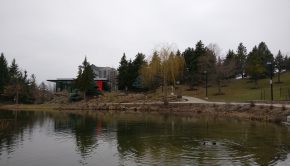Celebrating Canada’s Indigenous heritage
This November, the Ignite student centre will be full of Indigenous dancers – their traditional regalia flowing to the rhythmic heartbeat of a drum circle.
November is Aboriginal Education Month at Humber College and the Aboriginal Resource Centre (ARC) is hosting its annual All Nations Pow-Wow and services fair on Nov. 28.
Justine Keeshig has attended Humber pow-wows in the past and said these events provide a great opportunity to learn about Canada’s Indigenous heritage. “It brings awareness for people who don’t have a background in it, or understand it and they can actually see it and join in for their own experience,” said Keeshig.
Stacey Laforme, Chief of the Mississaugas of the New Credit First Nation, hoped that this generation will make great progress in addressing Canada’s history.
“They’re so intelligent, so ready to be involved and do things, so that’s very comforting to somebody like me,” said Laforme.
One Indigenous issue that has received a lot of exposure this year is the story of Chanie Wenjack. According to the Truth and Reconciliation Commission of Canada, released in 2015, he was one of over 150,000 Indigenous children who were removed from their families and placed in residential schools. These schools were designed to assimilate them into Canadian society while also diminishing their culture.
Wenjack’s story has been revived through a new project started by Canadian musician Gord Downie. He collaborated with graphic artist Jeff Lemire to create The Secret Path, a documentary about Wenjack’s escape from school, and later, his death.
The story of Canada’s residential school system is not well-known despite efforts through the years. According to Jesse Wente, an Ojibwa broadcaster, only 40 per cent of people have heard of the TRC or the issues that Indigenous people face to this day.
According to Wente, reserves closer to urban centres have been much more successful than remote communities thanks to the availability of services and support. But, this doesn’t mean that they don’t have issues of their own.
“Our rural communities have been systematically under-resourced since they were established,” said Wente.
Grace Esquega is the coordinator of Humber’s Aboriginal Resource Centre. She stressed the importance of collaboration to correct issues that still exist.
“Canada needs to come together as a whole and that’s how these problems are going to resolve,” she said.
Esquega encourages all students to reach out to local Indigenous centres and participate in their events and learning opportunities.
At the end of November, the ARC will host a moccasin-making workshop. As with all of its events, all students are welcome and encouraged to attend.





